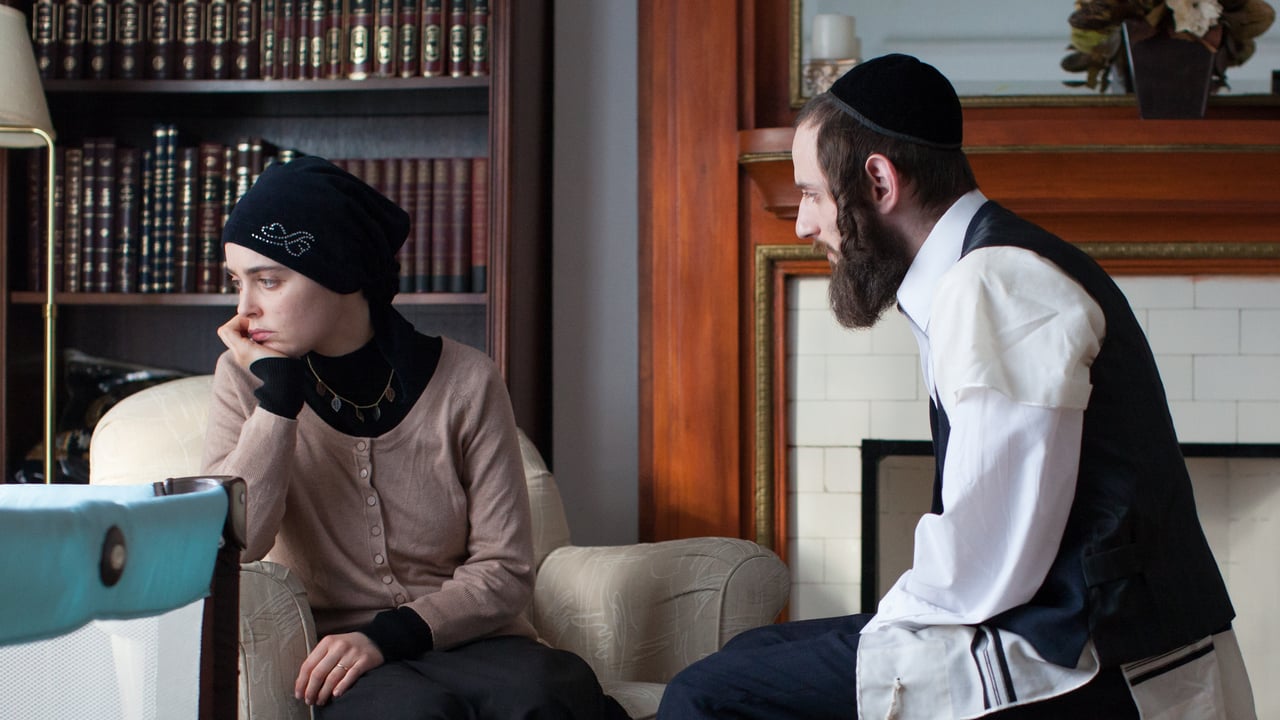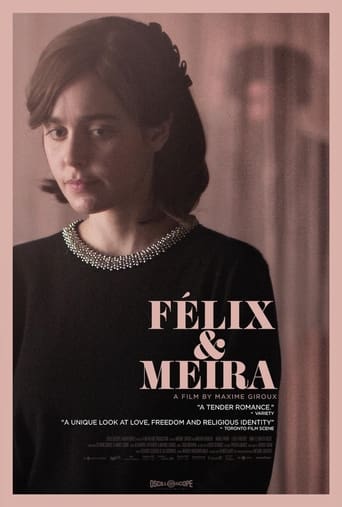Platicsco
Good story, Not enough for a whole film
ChicDragon
It's a mild crowd pleaser for people who are exhausted by blockbusters.
Matylda Swan
It is a whirlwind of delight --- attractive actors, stunning couture, spectacular sets and outrageous parties.
Philippa
All of these films share one commonality, that being a kind of emotional center that humanizes a cast of monsters.
Maria Golumbovska
It is always good to be able to define yourself. Even if traditions contradict your mind. In this film I saw the case when traditions are evil that rules over weak people. ....and love is not a tradition, it is a decision, not possible without knowing yourself. I like enormously the film, three main actors played excellent. What impressed me a lot were two sequences: the first one - the conversation between а "tradition man" Luzer Twersky and а "non tradition man" Martin Dubreuil; and the second one - when a "tradition man" broke his tradition listening to the song "After Laughter "after his wife left him.
Paul Allaer
"Felix and Meira" (2014 release from Canada; 195 min.) brings the story of the two title characters. As the movie opens, we see Meira serving dinner to a group of Hasadic Jewish couples. Not a word is said during dinner, and you can immediately sense a sadness within Meira. It's only later that we understand she is bored and frustrated and suffocating under the tight-knit rules of the Hasadic Jewish community. Then we get to know Felix, a secular Jew whose father is dying. The two were not close but it still affects Felix significantly. One day, Felix runs into Meira and her 3 yr. old baby girl at the local coffee shop. He tries to strike up a conversation but she rejects him. Later on, though, it becomes clear that something is brewing between Felix and Meira. At this point we're at most 15-20 min. into the movie but to tell you more would spoil your viewing experience. You'll just have to see for yourself how it all plays out.Couple of comments: this is the third full-length feature from Canadian writer-director Maxime Giroux. This time he tackles a story line that plays out on the closed community that is the Hasadic Jewish Community. The 2012 "Fill The Voice" film explored similar themes as to the isolated Hasadic Jewish community, but here Giroux decides to make it even more personal by focusing on Meira and her conflicted feelings as to her overall life. In the beginning of the movie, Meira 'plays dead' to tease her husband. Much later on, when her husband asks why she doesn't do that anymore, Meira wistfully replies "Who says I'm not dead already?", wow. (And her husband's response to that? "When will you finally understand that this is our life? Pull yourself together!") It should be noted that, even though the closeness/isolationism of the Hasadic Jewish community can be an easy target for criticism, the movie treats them at all times with a great amount of respect. The acting performances are top-notch all the way, in fact I was wondering whether the Hasadic Jews were portrayed by actors or by real Hasadic Jews. Hadas Yaron as Meira is outstanding (she also played the role of a Hasadic Jewish wife in "Fill the Void" by the way.) Compared to that, Martin Dubreuil as Felix has a harder time staying in the lime light. Last but not least, there is an outstanding clarinet-heavy musical score (composed to Olivier Alary), and even fellow Canadian Leonard Cohen contributes a tune ("Famous Blue Raincoat"). Bottom line: this is a slow-moving (in the best possible way) family drama set within the Hasadic Jewish community that caught my attention from start to finish."Felix and Meira" opened without any pre-release fanfare or advertising at my local art-house theater here in Cincinnati this Memorial Day weekend. The matinée screening where I saw this at was very nicely attended, somewhat to my surprise to be honest (the audience was heavy on the seniors, I might add). If you are in the mood for a top-notch quality foreign movie that is GALAXIES away from the latest Mad Max or Pitch Perfect, do yourself a favor and check this out, be it in the theater, or eventually on VDV/Blu-ray. "Felix and Meira" is HIGHLY RECOMMENDED!
Hint523
Felix and Meria begins with a traditional Hasidic Jewish dinner: singing, celebration and religious clothing. Everyone seems comfortable except for Meria, our protagonist, and immediately through visuals we sense that something does not sit well with her. Thus begins the major conflict of the film as Meria debates internally her commitment to tradition.Because of the timeless nature of this culture, at the beginning it is deliberately unclear what time period the film takes place in. Meria is scolded by her extremely traditional husband for playing LP records, indicating the film is a period piece. Yet as the film goes on and Meria slowly ventures outside of her Hasidic bubble, we realize that the film does in fact take place in present day, yet we discover it through her eyes and slowly it becomes more modern. The visual palette (like a love child of last year's Ida and A Most Violent Year) distinctly drives Meria's journey. This makes the modern world look in a distinct way unlike anything I have ever seen in a movie.While focusing on Meria and her doubts in her beliefs, it quick develops into a love story. Despite being married and living among the traditional culture, Meria falls for Felix, a bachelor without the same family values. This isn't the adulterous kind of romance - everything is subdued, making even holding hands feel like a display of passion. The suspense remains because of how forbidden the relationship is in the first place, and thanks to top-tier performances and direction, the relationship between protagonists never feels inauthentic.The dramatic sequences scattered throughout the film significantly outweigh the overall narrative. The symbols are rich without being overt. As said above, this is a movie full of subtlety that matches the emotional tone of the characters. The only not subtle moment happens right after Felix and Meria first spend time together, when the film transitions to an isolated clip seemingly unrelated yet emotionally moving. I would have been happy to see more of these, but alas because it only happened once it draws more power to itself.As stated above the primary conflict of the film is tradition vs. love, which is incredibly powerful yet not as universal in today's world. Unfortunately, Meria's husband is reduced to being a caricature and not given enough complexity as a character. Had he been more layered, it would increase the stakes in how difficult it would be for Meria to decide to stray away from him. Regardless, this is the romantic drama that people should yearn for. Most romance audience prefer the more saccharine Nicholas Sparks adaptations, but could truly enjoy seeing something much more subtle and powerful as seen in Felix and Meria.
Albert Ohayon
I was completely blown away by this unique film. It is a gentle, nuanced look at two people from very different communities who connect and fall in love. The young woman is from the Hassidic community in Montreal. She is questioning her life and the limitations imposed on her by her community. The man she meets is not from her community and at a crossroads in his life. While this premise might seem implausible, it is explored with subtlety and respect. I cannot forget to praise the terrific performances of the three main actors. Israeli actress Hadas Yaron is simply amazing as Meria, the young Hassidic woman who is stifling in her marriage and community. Martin Dubreuil is also very good as Felix who is in search of something but is not quite sure what. All he knows is that he is instantly attracted to the shy, reluctant young woman and he must try to connect with her in any way he can. The chemistry between the two is simply electric. The character of Meira's husband could have easily been portrayed as the clichéd overbearing, uncaring spouse. Instead, actor Luzer Twersky makes him a sympathetic character trapped by his own failings. He simply does not know how to deal with his wife's angst. There are some incredible moments of tenderness in this film (The first time Felix and Meira hold hands is understated but very powerful). Overall this is a beautiful layered love story that is full of hope and happiness. Love will always find a way. Not to be missed. Bravo Maxime Giroux for giving us such a beautiful film.

